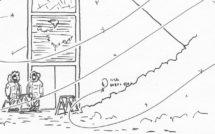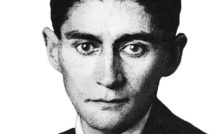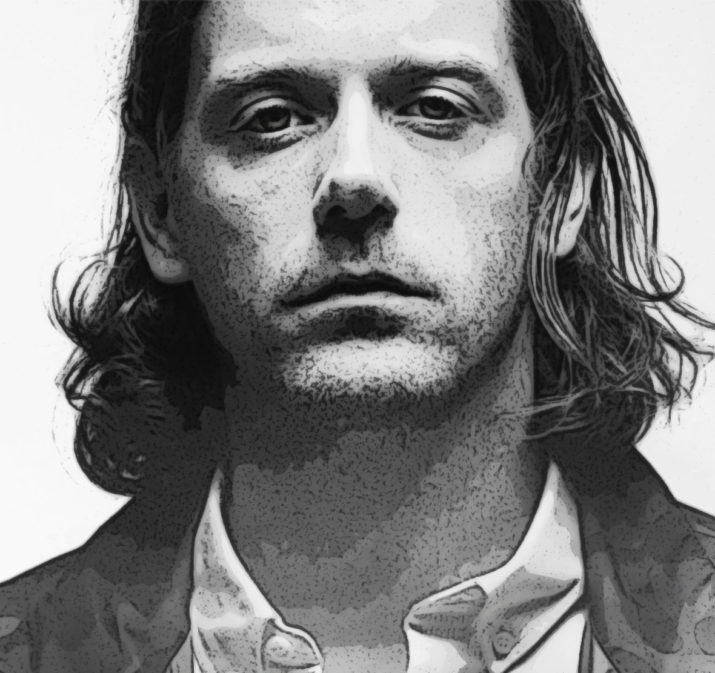
Translated from the Swedish by Elizabeth Clark Wessel & Kirkwood Adams.
This is part of our special feature Facing the Anthropocene.
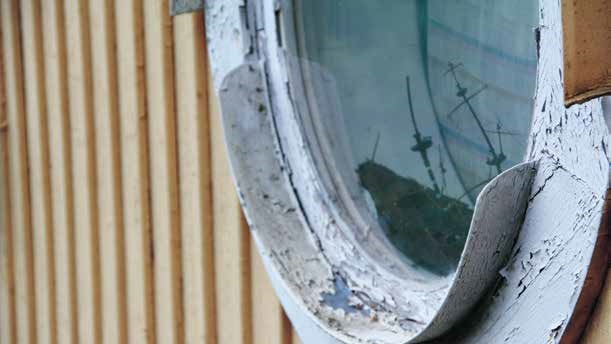
7. It’s raining, of course. [12]
[12] Tall grass, a flock of birds taking off. The only intact light, lit during daytime. The road covered in moss, a slow soundtrack, the pizzeria in the park: lost in a wall of forest, steaming, whistling, squeaking. High school football. And images moving gently. Old leaves remain until spring. Eat canned mushrooms, watch condensation form on the outside of the windows, time. The only light: the emergency generator of the hospital. The car is still sinking, the electricity quietly wandering in the treetops. And it’s raining, of course.
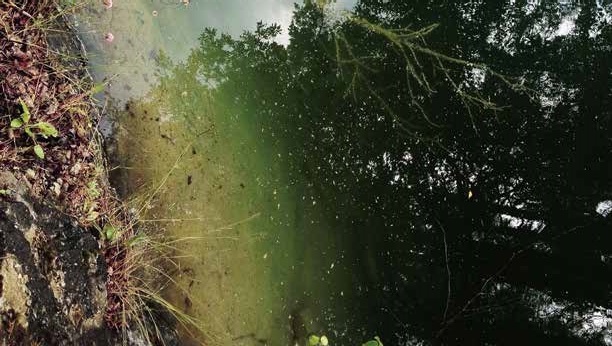
8. And I wrote –
……………………..Ask: and the laws of physics are repealed.
……………………..If the wind carries red sand, is it visible.
………………………………..Starry sky, scattered within the branches of the pistachio tree.
……………………..Until we turn away. (And then. It continues.)
……………………..You can’t look straight at it.
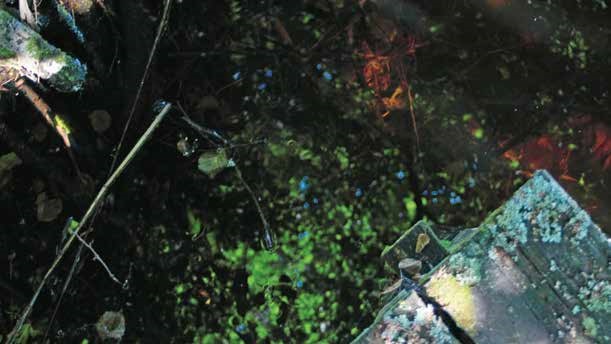
9. ………………….Ask: the hum of branches ringing in the body,
……………………..a nervous shimmer, change inside a frequency. Therein
………………………………….a tone, blood red.
……………………..Listen quietly to the storm, until we turn away.
……………………..The pattern of the wind twisting, a theory of everything: a rush of heat to the face.
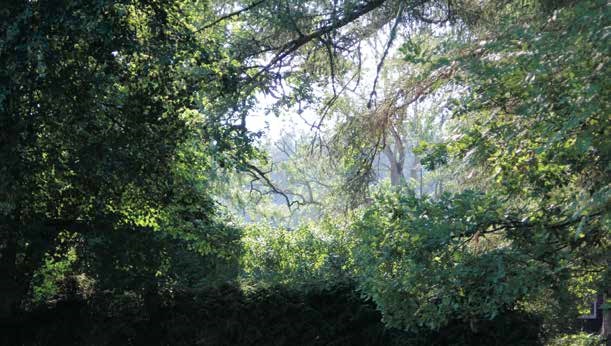
10. ………………….Ask: gravity, radiation, making it visible.
……………………….To accept that, is music. Notes from a meeting:
……………………………………Giving. Is central.
……………………….Wanting to ask. Not answer. And the universe expands.
……………………….“We thought we could control the night.” And it continues:
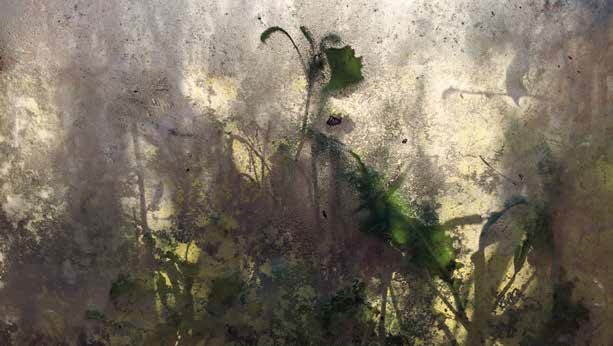
11. Underneath some junk in the basement I found a plastic bottle with a dead hazel dormouse inside it.
……It made its way into the bottle, but couldn’t get out. [13]
[13] A model of a blue whale just the right size to wrap your arms around, or to fill up a dusty loft. Symbols etched into its flanks, hidden speakers (a muddy sound wave comes and goes) placed inside its body, its lights don’t work. Run a hand along the dusty surface, trying to decode the alphabet.
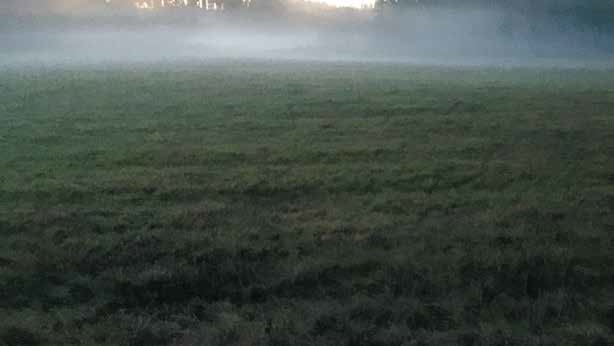
12. The landscape elevated [14] [15] and placed in the cargo hold of an unmanned spaceship. The vegetation
……spreads through the ventilation, forming forests, swamps, fields, a cloud (shadows). [16] [17]
[14] A patch of a little less than a kilometer.
[15] Terraforming is the process of… the wooden skeleton sinks into the ground, the glass panes break one by one, the roof bends in the downpour.
[16] The birds have moved into the piano. When they land the strings vibrate from the draft, a silent tone fills the room, the light from the screens fainter and fainter.
[17] The silence different, heavy, flat, an hour-long exhalation below the floor, and the smell of old leaves in the background. After crawling inside I was struck by a weird notion – that someone had come into the room and was entering the tunnel behind me. I scrambled the last meters without looking over my shoulder, tried to turn around, couldn’t, quickly stood up, and smashed my head on a hard layer of branches and soil.
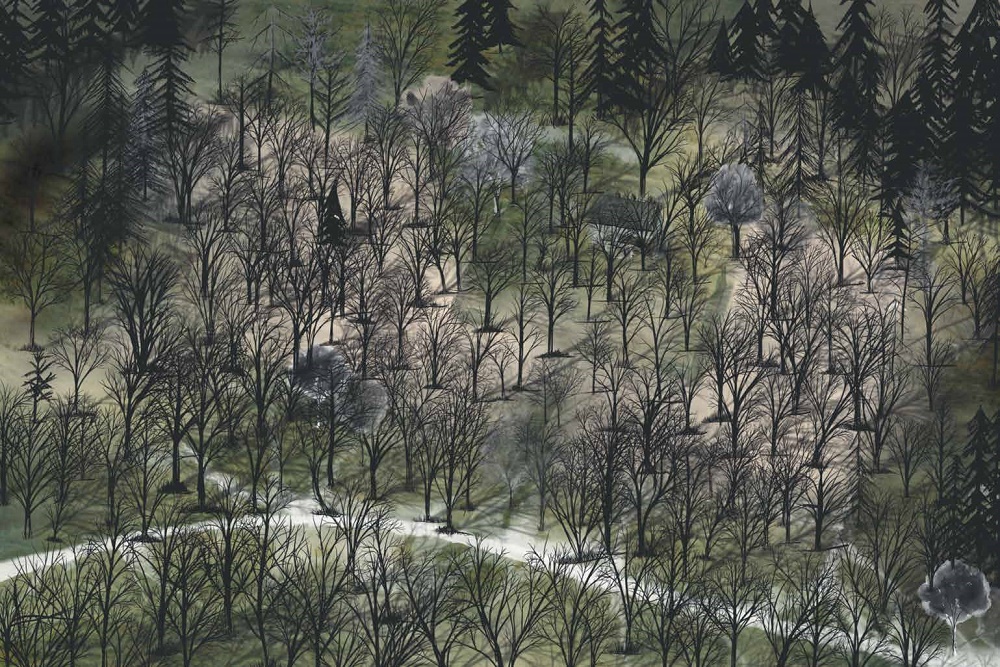
***
***
Johannes Heldén is a visual artist, writer and musician. His work deals with artificial intelligence, ecology, poetry, science fiction, sentience and interactive narrative structures. He has published twelve books, most recently Astroecology (2016) which was published in three languages and made into an interdisciplinary performance at The Royal Dramatic Theatre in Stockholm, and a digital artwork published by Bonniers Konsthall. Heldén was the recipient of the Åke Andrén Art Prize in 2015 and the Evolution project won the inaugural N. Katherine Hayles prize in 2014. He has published four music albums, most recently System (Irrlicht), and seven digital online works of poetry and visual art. His work has recently been shown at ISEA in Vancouver, Broken Dimanche in Berlin, Bonniers Konsthall in Stockholm, Centre Pompidou in Paris, Inspace in Edinburgh, Moderna Museet Stockholm, UB Center for the Arts Buffalo, The Fifth Moscow Biennale, The Media Archaelogy Lab/University of Colorado, Volt in Bergen, ICIDS Istanbul, NIMK in Amsterdam, Dome of Visions in Copenhagen, UKS in Oslo among others. He is a fellow of the MacDowell Colony, Headlands Center for the Arts, Hawthornden Castle et al.
Kirkwood Adams is a teacher and writer in New York.
Elizabeth Clark Wessel is a founding editor of Argos Books and co-editor of Circumference: Poetry in Translation. She is the author of three chapbooks: Whither Weather (GreenTower Press, 2012), Isn’t that You Waving at You (Big Lucks Books, 2015) and Amsterdam (Dancing Girl Press, 2015). Her full-length collection Two Suns is forthcoming from The Lit Pub. She recently moved to a farmhouse in Connecticut and translates fiction from Swedish for a living.

These excerpts from Astroecology are published by permission of Argos Books. Copyright © 2016 Johannes Heldén. Translation copyright © 2017 Kirkwood Adams and Elizabeth Clark Wessel.
Photo: Johannes Heldén, Martin Vallin
Photo: Kirkwood Adams, private
Photo: Elizabeth Clark Wessel, private
Published on May 2, 2017.

